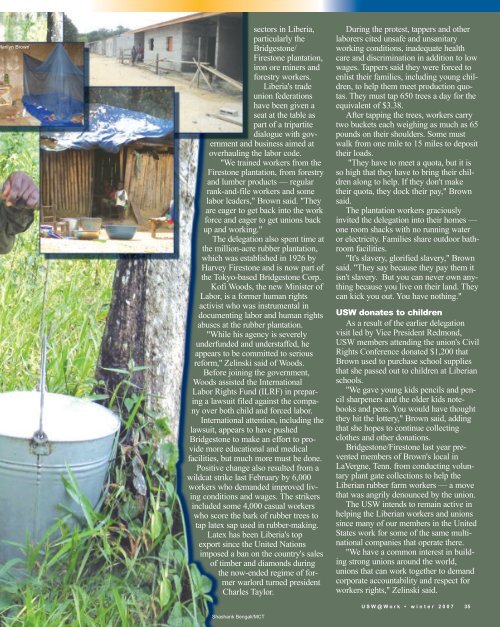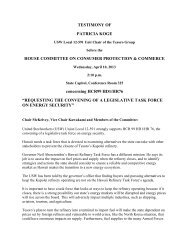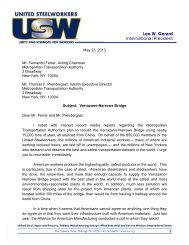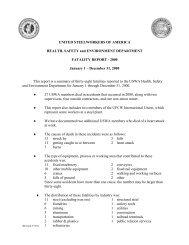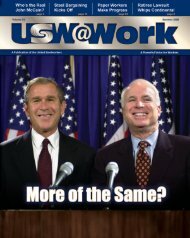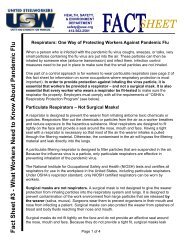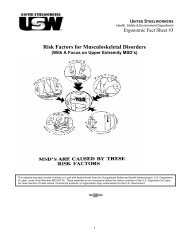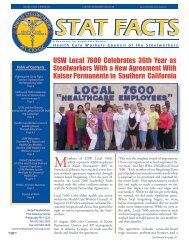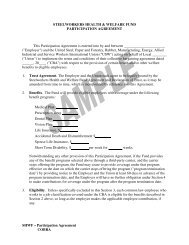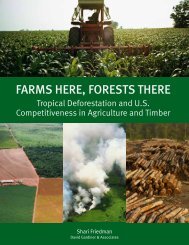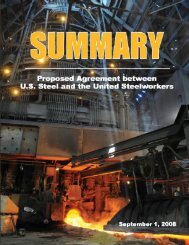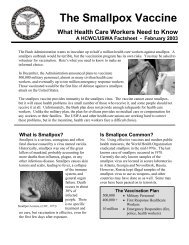USW@Work - National College Players Association - United ...
USW@Work - National College Players Association - United ...
USW@Work - National College Players Association - United ...
- No tags were found...
You also want an ePaper? Increase the reach of your titles
YUMPU automatically turns print PDFs into web optimized ePapers that Google loves.
arilyn Brownsectors in Liberia,particularly theBridgestone/Firestone plantation,iron ore miners andforestry workers.Liberia's tradeunion federationshave been given aseat at the table aspart of a tripartitedialogue with governmentand business aimed atoverhauling the labor code."We trained workers from theFirestone plantation, from forestryand lumber products — regularrank-and-file workers and somelabor leaders," Brown said. "Theyare eager to get back into the workforce and eager to get unions backup and working."The delegation also spent time atthe million-acre rubber plantation,which was established in 1926 byHarvey Firestone and is now part ofthe Tokyo-based Bridgestone Corp.Kofi Woods, the new Minister ofLabor, is a former human rightsactivist who was instrumental indocumenting labor and human rightsabuses at the rubber plantation."While his agency is severelyunderfunded and understaffed, heappears to be committed to seriousreform,'' Zelinski said of Woods.Before joining the government,Woods assisted the InternationalLabor Rights Fund (ILRF) in preparinga lawsuit filed against the companyover both child and forced labor.International attention, including thelawsuit, appears to have pushedBridgestone to make an effort to providemore educational and medicalfacilities, but much more must be done.Positive change also resulted from awildcat strike last February by 6,000workers who demanded improved livingconditions and wages. The strikersincluded some 4,000 casual workerswho score the bark of rubber trees totap latex sap used in rubber-making.Latex has been Liberia's topexport since the <strong>United</strong> Nationsimposed a ban on the country's salesof timber and diamonds duringthe now-ended regime of formerwarlord turned presidentCharles Taylor.Shashank Bengali/MCTDuring the protest, tappers and otherlaborers cited unsafe and unsanitaryworking conditions, inadequate healthcare and discrimination in addition to lowwages. Tappers said they were forced toenlist their families, including young children,to help them meet production quotas.They must tap 650 trees a day for theequivalent of $3.38.After tapping the trees, workers carrytwo buckets each weighing as much as 65pounds on their shoulders. Some mustwalk from one mile to 15 miles to deposittheir loads."They have to meet a quota, but it isso high that they have to bring their childrenalong to help. If they don't maketheir quota, they dock their pay," Brownsaid.The plantation workers graciouslyinvited the delegation into their homes —one room shacks with no running wateror electricity. Families share outdoor bathroomfacilities."It's slavery, glorified slavery," Brownsaid. "They say because they pay them itisn't slavery. But you can never own anythingbecause you live on their land. Theycan kick you out. You have nothing."USW donates to childrenAs a result of the earlier delegationvisit led by Vice President Redmond,USW members attending the union's CivilRights Conference donated $1,200 thatBrown used to purchase school suppliesthat she passed out to children at Liberianschools."We gave young kids pencils and pencilsharpeners and the older kids notebooksand pens. You would have thoughtthey hit the lottery," Brown said, addingthat she hopes to continue collectingclothes and other donations.Bridgestone/Firestone last year preventedmembers of Brown's local inLaVergne, Tenn. from conducting voluntaryplant gate collections to help theLiberian rubber farm workers — a movethat was angrily denounced by the union.The USW intends to remain active inhelping the Liberian workers and unionssince many of our members in the <strong>United</strong>States work for some of the same multinationalcompanies that operate there."We have a common interest in buildingstrong unions around the world,unions that can work together to demandcorporate accountability and respect forworkers rights," Zelinski said.<strong>USW@Work</strong> • winter 2007 35


